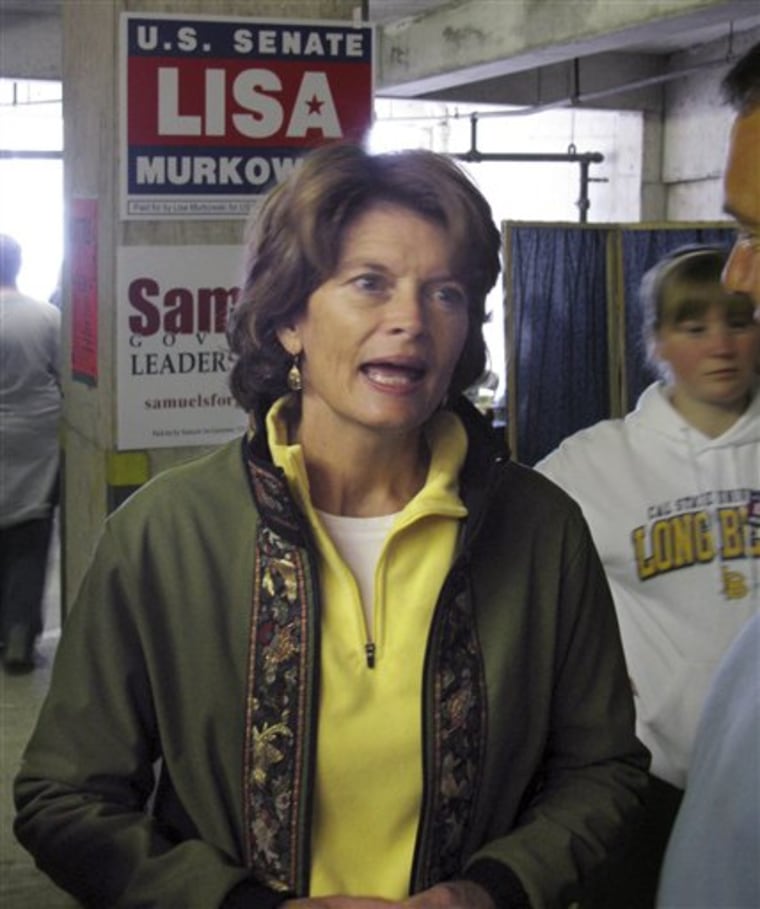Alaska Sen. Lisa Murkowski fought to save her job Wednesday, locked in a stunningly tight Republican primary race against a political novice backed by Sarah Palin and tea party activists. The outlook was far brighter for another incumbent, Sen. John McCain, who won handily in Arizona.
With 98 percent of election day precincts counted, Murkowski trailed Joe Miller by 1,960 votes out of more than 91,000 counted. The race was too close to call, with as many as 16,000 absentee votes and an undetermined number of provisional or questioned ballots, remaining to be counted starting on Aug. 31.
Murkowski would be the seventh incumbent — and fourth Republican — to lose in a year in which the tea party has scored huge victories in GOP Senate primaries and voters have shown a willingness to punish Republicans and a handful of Democrats with ties to Washington and party leadership. Miller is a Gulf War veteran and self-described "constitutional conservative."
It also was an outsider's night in Florida's GOP primary for governor, with big-spending upstart Rick Scott toppling veteran insider Bill McCollum, the state's attorney general who had the support of national party chiefs.
Five states — Arizona, Vermont and Oklahoma also voted — held nominating contests Tuesday, 10 weeks before the general election. The races highlighted dominant themes of this volatile election year, including anti-establishment anger and tea party challenges from the right.
Elsewhere, the establishment prevailed.
McCain easily cinched his party's renomination — and likely re-election this fall — by dispatching former Rep. J.D. Hayworth, who had tea party support. The 2008 GOP presidential nominee spent more than $20 million on the primary. Rep. Kendrick Meek cruised to the Democratic Senate nod in Florida against a wealthy political newcomer. And a slew of Republican and Democratic members of Congress withstood primary challenges.
But Murkowski's unexpectedly tough battle and Scott's victory underscored the unpredictability of this election year ahead of November, when control of both houses of Congress will be at stake.
The 2010 midterm elections already have seen six incumbents lose. Sen. Robert Bennett, R-Utah, was ousted by his party. Sen. Arlen Specter, D-Pa., and Reps. Alan Mollohan, D-W.Va., Parker Griffith, R-Ala., Bob Inglis, R-S.C., and Carolyn Cheeks Kilpatrick, D-Mich., failed in primary bids.
Now Murkowski might.
Appointed in 2002, she is seeking her second full term and was expected to coast to re-election.
Miller initially looked like a long shot, but he started to gain steam as the primary approached. He drew the backing of the Tea Party Express, a California-based group that's run ads, held rallies and questioned Murkowski's conservative credentials. Also, Palin, the former Alaska governor, and her husband, Todd, rallied behind Miller in the final days, lending their name to get-out-the-vote efforts.
Like Utah's Bennett, Murkowski had stressed that seniority mattered in the U.S. Senate, where years of service translated into billions of dollars for roads, ports, bridges and other home state projects. Alaskan voters were reminded of that earlier this month when former Sen. Ted Stevens died in a plane crash. For four decades, Stevens consistently delivered federal dollars that transformed the 49th state.
The race also had personal overtones.
Palin trounced Murkowski's father, Frank Murkowski, in a 2006 GOP gubernatorial primary that launched the 2008 vice presidential nominee's national political career. And when Palin abruptly resigned her governor's post last summer, Lisa Murkowski said she was "deeply disappointed that the governor has decided to abandon the state and her constituents before her term has concluded."
The GOP primary winner will be favored in November over Sitka Mayor Scott McAdams, who won the Democratic nomination.
In Florida, Scott's financial might and criticism of his opponent as a typical tax-raising politician proved too much for McCollum, a former congressman, in the bitter GOP gubernatorial race.
Scott, who made a fortune in the health care industry and spent $39 million of it blanketing the state with TV ads, resonated with GOP voters as a "conservative outsider" who could run state government like an efficient business and reduce taxes. He overcame accusations that he was in charge when his former hospital conglomerate paid $1.7 billion to settle federal Medicare fraud charges.
That issue is likely to come up again as he faces Alex Sink, the state's chief financial officer, who sailed to the Democratic nomination.
The peril establishment candidates face was not lost on McCain, who was at the pinnacle of the GOP hierarchy just two years ago as the Republican presidential nominee.
"I promise you, I take nothing for granted and will fight with every ounce of strength and conviction I possess to make the case for my continued service in the Senate," McCain told supporters in Arizona, quickly focusing on the fall campaign in his bid for a fifth term.
Also in Arizona, the son of former Vice President Dan Quayle won the Republican primary for an Arizona congressional seat. Ben Quayle emerged from a crowded field in the fight for an open seat in a Republican-leaning district in the Phoenix area.
Vermont Democratic Sen. Patrick Leahy, first elected in 1974, coasted to renomination for what is likely to be a new term in November.
In the Democratic gubernatorial race, state Senate President Pro Tem Peter Shumlin claimed victory Wednesday in the five-way contest. "It appears that we have won," Shumlin told The Associated Press.
He held a lead of fewer than 200 votes over state Sen. Douglas Racine, with Secretary of State Deb Markowitz a very close third.
The AP has not called the winner because the race is still too close with nearly all the votes counted.
If the vote count holds, either Racine or Markowitz could ask for a recount.
The winner of the Democratic primary will face Republican Lt. Gov. Brian Dubie, who did not face a primary opponent.
